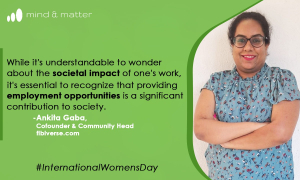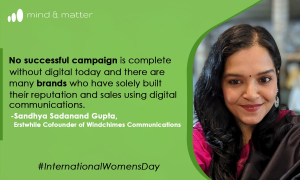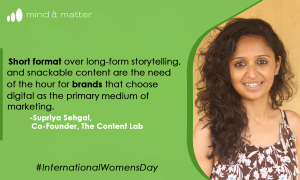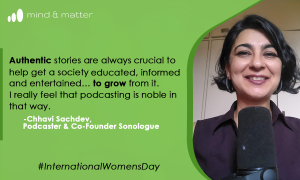I've run Sonologue since 2008. When I started, I was a podcaster. I was creating the content, recording the content, and doing all the back-end work, and producing my own podcast. My background is in journalism, so I wasn't new to the idea of creating interviews and features myself. I just needed to learn a new skill set in terms of sound editing, engineering, mixing.
Working with the sound and then distributing it, which is very different for audio than it would be for, say, at that point in 2008, blogging was very big. In some ways it was similar. We had to upload it to a platform, burn an RSS feed and then distribute it. We didn't have smartphones. So we had to link it up with the cable from the cloud (well, we didn't even call it a cloud then), from the internet server to our desktop or laptop and then use a cable to download it onto an MP3 player. That's how it began.
When I started, my business was not exactly where it is now. It has morphed and also expanded with the changing times. When I started, the business market opportunities I saw were actually in the existing media. I thought I would make programming for terrestrial radio stations. So, I approached FM stations and then community radio stations to try to sell them informational, interesting and educational, but also innovative, audio programming.
Podcasting was something I was doing on the side for myself because none of these radio stations wanted content that was not Bollywood or cricket, and that is all they were interested in running on their broadcasts. Since I saw no avenue to talk to interesting people, I interviewed them on culture. One of the first podcasts I started was about Indians returned from abroad (i.e. Indians who had moved away in the 90’s or the 80’s and the challenges they were facing when they returned in the 2000’s). I saw no market opportunities for those either. Then I focused on getting ads, translated videos in audio non-fiction, but not in terms of actual programming and content.
My business goals were to sell the content to existing platforms. I realized very quickly that that was not going to happen. With podcasting, I could not sustain being a podcaster; it was a very nascent field. People didn't even understand what it was. Also, I couldn't find anybody to pay me for it. So I continued to freelance in social media and even took up a job in audio non-fiction production, making self-guided audio tours for a while, while I made podcasts as a side hustle.
Again, there were no business and marketing opportunities at that point, except for radio stations. As you can see, podcasting has evolved quite a bit since then. I will add though, that around 2011, what I figured out was that the market wasn't growing and I had to do my bit to grow it. That's when I started teaching podcasting workshops.
My goal was to increase the tribe. I thought if I teach people how to make them, it will grow the supply side of the business. The thought was, if I teach ten people to make a podcast, they will tell 100 people to listen to their podcasts and then we will incrementally grow the field. That was what I started doing. I started teaching workshops on making audio programming content and podcasting so that it would grow itself. And so, that was an opportunity I saw and seized, and I continued to do podcasts there. This too has evolved since then.
Then Spotify, an audio streaming platform, entered the scene. Spotify hooked people through music to come on to podcasts. They gave people a platform to upload, distribute, record, even podcasts for free. It did all of us a big favour in many ways by making podcasts mainstream. So that was a big step in the evolution of podcasts in India, a missed opportunity by many, many players up till then because nobody had that kind of size and might that Spotify did and does. It ushered in a new era. So that's part of the podcasting evolution.
Simultaneously, non-profit organizations started to see that podcasts are a very good way to give voice to the people who are generally not represented in mainstream media. You know, they're usually filtered through a narrator or a corporate or a funding agency, and a podcast literally gives you access to their voice, the actual voices of people in the ground, on the ground. I got invited to do workshops for developmental organizations, which is very fulfilling for me. That too has been an evolution in terms of reach of what podcasts are being used for as a tool.
A lot of people wanted to start making podcasts because they understood they would have a first-mover advantage and they would be able to position themselves as industry- or thought-leaders by putting out content that could be consumed in audio. When smartphones came along, they understood the beauty of podcasts, and the reason podcasts are still exciting, relevant and will continue to be, is that they're one of the few ways you can share or consume information that is location agnostic, time agnostic, and also because you can access anything that you want. It's a pull medium so people can seek out what they need actively rather than passively consuming. You can find what you want when you want, where you want and from wherever you want.
People who understood that as early as 2016-17 started to get in touch with me to help them create podcasts. It was helpful because it turned into my calling card. It was proof of concept that I could produce with my team, very good quality audio, and that's what translated into the market opening up for me. People started to appreciate that this is a valuable piece of content, and that it is very targeted because people are coming to it from an interest, not passively.
Because I work with non-fiction generally, I've also worked with the nonprofit sector. With a background and training in journalism, I've always wanted to give voice to the people who are marginalized or underrepresented. And, on this, Sonologue occupies a sort of niche. That’s not to say that that’s all we do, but we have done a lot of work which helps other nonprofits find us. And we're very, very grateful for the opportunity because this is the missing link, I think, in letting society understand what is happening around them.
It is like breaking bread with somebody or hearing somebody's story that lets people connect to each other. And podcasts are the most immediate way of doing that. So, I feel very strongly about the benefit of getting real people, real voices, real solutions to real problems aired out and in their own voices. That's perhaps a very narrow way of looking at what I do and what Sonologue does... even if you extrapolate that to people who just want to review food or share their personal experience on a topic like mental health or education.
Authentic stories are always crucial to help get a society educated, informed and entertained… to grow from it. I really feel that podcasting is noble in that way. You can call me very optimistic, even naïve, or that I've got rose-coloured glasses on about the role podcasting plays in society, but I think it is totally beneficial.
I can't speak about what's going to happen in three years, but I do feel that a distinction will need to be made between the podcasters who are big players and have teams working with them (I would like to call them indie podcasters), and podcasters who work solo, or possibly with 1 or 2 other people, and no monetary gain in terms of their approach and in terms of their reach.
I think the market is only going to grow, and what I expect to see is better opportunities for monetization for the indie podcasters. I hope (and I really am holding out on hope for this), that people who podcast because they feel like they have something to say even without the backing of a studio or a commissioning agency will continue to speak their truth and turn it into something they can do full time. I think that time will come. So, that's what I'm looking forward to in terms of growth and change in the podcasting industry.




